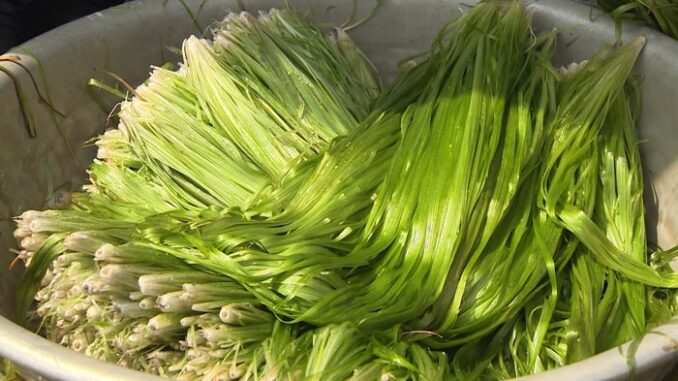
Bon Bon, Tree Nan, and He Nuoc are 3 specialties of the South with delicious taste, some have to wait until the floating season to enjoy.
Bon Bon (candle grass) is a wild plant that lives in wetlands in ponds or rivers. The plant grows all year round but is best in the rainy season. Dishes made from tubs are very popular and considered a specialty of the West.

Tan Hung Dong commune, Cai Nuoc district is a large basin growing area of Ca Mau province. Due to the inefficient cultivation of rice and shrimp, people have converted their production to growing cycads. The plant is well adapted to fresh water and is resistant to alum salt, does not take much care, and is a clean vegetable with a high yield.
The tub is plucked by hand or cut close to the base with a sharp knife. When the tree is uprooted, the roots are cut off and the long leaves are cut off, keeping the stem part close to the root, then it is preliminarily processed to remove all the old sheath, keeping the young core. Tub Tu can be processed into many delicious dishes such as making melon, making a salad, stir-frying with shrimp, or cooking soup, dipping hot pot is also very delicious.
Tree Nan (repentance) is a plant belonging to the sedge family, which is collected all year round but grows strongly in the rainy season. In the past, it was just wild grass, with no economic value, but today it is widely grown in many southwestern provinces, where there is alum lowland. Cultivation is also considered the main occupation of many households in Soc Trang and Bac Lieu.

Harvesting must choose newly grown trees that rise out of the water about a hand and must be pulled so that the tree is not broken. After plucking, the penguins are washed and cut short to only about 30 cm. When repenting, people peel off the outer shell, keeping the white body inside, which looks delicious, the tree is used to eat raw, served with fish sauce hotpot, fish soup, field crab soup.
Water He is a type of vegetable that grows wild in fields, canals, and swamps in the acidic soil of Dong Thap Muoi, abundant in the flood season every year. Water He has soft bodies, short bunched roots that cling to the muddy soil, so it is easy to pull up. In places where water chives grow, the water is very clear, so the harvester must follow the path, and avoid making the water cloudy and difficult to see the chives to pluck.

People call Water He a gift from heaven because the tree grows wild, without fertilizing or taking care of it. After the first few spots of rain of the season, when the alum fields are flooded, the water He begins to sprout and grow through the water. Water He is usually harvested at dawn, after uprooting, they are preliminarily processed on the spot, rooted and washed, neatly stacked, and weighed for termites.
Many people like Water He, because this is a clean vegetable, cool and crispy, dipping in a hot pot with fish sauce, is very delicious, you can also take freshwater He and roll them to dip them in braised fish sauce. The crisp taste of shallots and the rich sweetness of the fish sauce blend together to make a memorable floating season meal.
